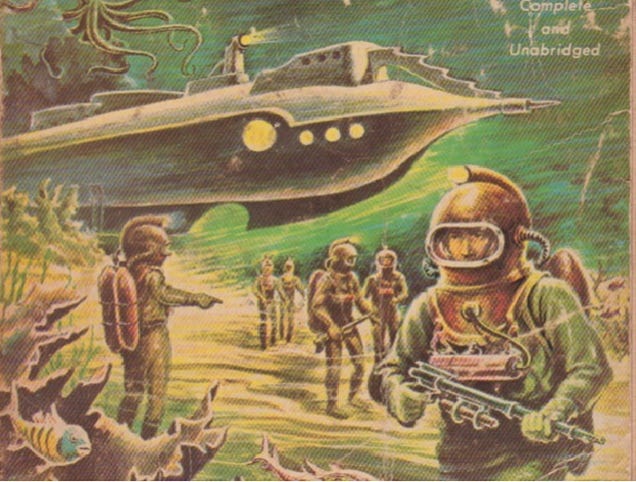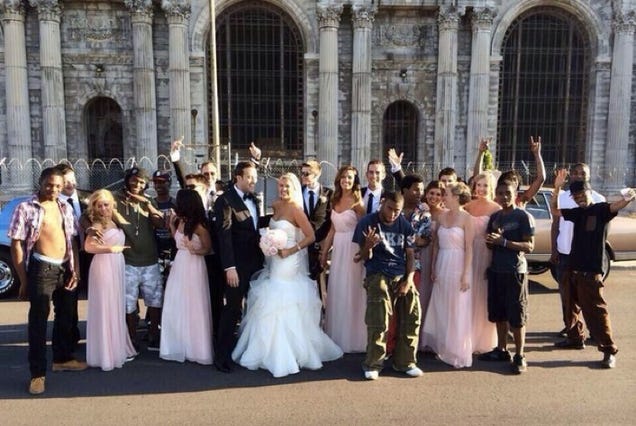![21 Books That Changed Science Fiction And Fantasy Forever]()
Speculative fiction is the literature of change and discovery. But every now and then, a book comes along that changes the rules of science fiction and fantasy for everybody. Certain great books inspire scores of authors to create something new. Here are 21 of the most influential science fiction and fantasy books.
Top image: Magrathea from the Hitchhiker's Guide to the Galaxy, art by Microbot 23 on Deviant Art.
These are books which clearly inspired a generation of authors, and made a huge splash either in publishing success or critical acclaim. Or both. And these are in no particular order.
1) The Hitchhiker's Guide to the Galaxy by Douglas Adams
The first (maybe only) science-fiction-comedy-multimedia phenomenon, Hitchhiker's was a radio drama before it was a book, and the book sold 250,000 copies in its first three months.The Guardian named it one of the 1000 novels everyone must read, and a BBC poll ranked it fourth, out of 200, in their Big Read poll.
Ted Gioia comments on Adams' hilarious book about the trials and tribulations of Arthur Dent, the survivor of a destroyed Earth, across the universe:
No book better epitomizes the post-heroic tone of sci-fi than Douglas Adams' The Hitchhiker's Guide to the Galaxy. As the name indicates, a certain louche bohemianism permeates its pages. This is star-hopping on the cheap, pursued by those aiming not to conquer the universe, but merely sample its richeson fewer than thirty Altairian dollars per day. You can trace the lineage of many later science fictions books, with their hip and irreverent tone, back to this influential and much beloved predecessor.
![21 Books That Changed Science Fiction And Fantasy Forever]()
2) 20,000 Leagues Under the Sea by Jules Verne
Verne's whole career is full of works that have inspired generations of authors — but this tale of the underwater adventure of Captain Nemo and the Nautilus has also had a profound effect on science, and inspired real scientific advancement.
In the introduction to William Butcher's book Verne's Journey to the Centre of the Self Ray Bradbury wrote that, "We are all, in one way, children of Jules Verne. His name never stops. At aerospace or NASA gatherings, Verne is the verb that moves us to space."
Verne translator and scholar F.P. Walter added:
For many, then, this book has been a source of fascination, surely one of the most influential novels ever written, an inspiration for such scientists and discoverers as engineer Simon Lake, oceanographer William Beebe, polar traveler Sir Ernest Shackleton. Likewise Dr. Robert D. Ballard, finder of the sunken Titanic, confesses that this was his favorite book as a teenager, and Cousteau himself, most renowned of marine explorers, called it his shipboard bible.
![21 Books That Changed Science Fiction And Fantasy Forever]()
3) Dhalgren by Samuel R. Delaney
Sam Anderson prefaced his interview with Samuel R. Delany with this praise for Dhalgren's impact:
In the 35 years since its publication, Dhalgren has been adored and reviled with roughly equal vigor. It has been cited as the downfall of science fiction (Philip K. Dick once called it "the worst trash I've ever read"), turned into a rock opera, dropped by its publisher, and reissued by others. These days, it seems to have settled into the groove of a cult classic. In a foreword in the current edition, William Gibson describes the book as "a literary singularity" and Delany as "the most remarkable prose stylist to have emerged from the culture of American science fiction." Jonathan Lethem called it "the secret masterpiece, the city-book-labyrinth that has swallowed astonished readers alive.
Dhalgren has remained popular through the years, being reprinted 7 times since 1975. It was also dropped by Bantam, the original publisher, because of its willingness to tackle LGBT themes despite the fact that the Bantam version sold over a million copies and went through 19 printings.
And most of all, this is one of the books most often mentioned when authors mention works that spurred them to invention and boldness of experimentation with form.
![21 Books That Changed Science Fiction And Fantasy Forever]()
4) Lord of the Rings - J.R.R. Tolkien
Author Terry Brooks explains why this book made a whole genre possible:
I think I can safely assert that virtually every writer of fantasy working in the field today who began writing after the publication of the RINGS trilogy owes a debt to Tolkien. He may not have invented the form, but he provided it with its most important model in modern times and every writer is aware of its various components. Ask them. Few will dispute me. Moreover, the material has impacted writers working in other categories of fiction as well, not so much by its content as by its form and style. Not a month goes by that I don't read at least one interview or review that credits J.R.R. Tolkien with contributing to a writer's current work.
Cover art by Barbara Remington.
![21 Books That Changed Science Fiction And Fantasy Forever]()
5) War of the Worlds by H.G. Wells
In his book about The War of the Worlds, a seminal look at an invasion of Earth by Martians, author Brian Holmsten states:
Since 1898 the War of the Worlds has been translated into countless languages, adapted by comic books, radio, film, stage, and even computer games, and has inspired a wide range of alien invasion tales in every medium. Few ideas have captured the imagination of so many people all over the world in the last century so well. It is a tribute to H.G. Wells that his story of alien conquest was not only the first of its kind, but remains one of the best.
The 1927 American reprint, it can be argued, was one of the touching-off points for the Golden Age of science fiction. It inspired John W. Campbell to write and commission invasion stories — which also prompted authors like Arthur C. Clarke, Clifford Simak, Robert A. Heinlein and John Wyndham to do the same.
Image by My Reckless Creation
6) Foundation by Isaac Asimov
Foundation is a sweeping tale of pyschohistory and the battle for the intellectual soul of a civilization. and According to the BBC:
The Foundation series helped to launch the careers of three notable science fiction authors of the succeeding generation. Janet Asimov sanctioned these novels, which were published in the late 1990s: Foundation's Fear by Gregory Benford, Foundation and Chaos by Greg Bear, and Foundation's Triumph by David Brin." And without a doubt it launched the imaginations of countless other writers.
It is also worth mentioning that the Foundation series won the 1966 Hugo for best all-time series. An award that has not been given out since.
And this book's influence goes beyond science fiction: Artificial intelligence pioneer Marvin Minsky classified Asimov "among the finest of modern philosophers," and Nobel-prize-winning economist Paul Krugman describesFoundation as his version of Atlas Shrugged, "I didn't grow up wanting to be a square-jawed individualist or join a heroic quest; I grew up wanting to be Hari Seldon, using my understanding of the mathematics of human behaviour to save civilisation."
Cover art by Don Ivan Punchatz.
![21 Books That Changed Science Fiction And Fantasy Forever]()
7) Stranger in a Strange Land by Robert Heinlein
The first science-fiction work to enter the New York Times Book Review's bestseller list, Stranger sold 100,000 copies in hardcover and over five million in paperback. Kurt Vonnegut gloated on Heinlein's behalf, on the occasion of the novel's 30th "birthday," calling it "a wonderfully humanizing artifact for those who can enjoy thinking about the place of human beings not at a dinner table but in the universe."
And this book's influence (and that of Heinlein's other books) can't be overstated. Arthur D. Hlavaty refers to Heinlein as a prototypical science-fiction author, saying:
One of the ways human beings organize the world is by prototypes. We define a set as a typical example and a bunch of other things that are like it. For instance, when I was growing up, the prototype Writer was Shakespeare, the Artist was Rembrandt, and the Composer was Beethoven.In that way, Robert A. Heinlein has been often been taken as the prototype Science Fiction Writer, and as changes and new paradigms shake the field, he still sometimes represents the science fiction of the past.
Writer Ted Gioia looks at Stranger in a Strange Land's main character as a prototype for other similar characters in SF, saying: "Smith is more than a character. He is prototype of an alternative personality structure. The question of whether we can remake the human personality from the ground up." To date, there have been 28 editions of this book.
Cover art by James Warhola.
![21 Books That Changed Science Fiction And Fantasy Forever]()
8) Dangerous Visions, Edited by Harlan Ellison
This series helped launch the careers of almost every major author of the New Wave. The first volume included Samuel R. Delany, Philip K. Dick, and J.G. Ballard. In his introduction to the 2002 reissue of Ellison's anthology, contributor Michael Moorcock wrote of Ellison's collections:
He changed our world forever. And ironically, it is usually the mark of a world so fundamentally altered—be it by Stokely Carmichael or Martin Luther King Jr. or Lyndon Johnson, or Kate Millet—that nobody remembers what it was like before things got better. That's the real measure of Ellison's success.
"Gonna Roll the Bones" by Fritz Leiber won a Hugo Award and a Nebula Award for Best novelette. Philip K. Dick's "Faith of Our Fathers" was also nominated for best novelette. "Riders of the Purple Wage" a novella by Philip José Farmer tied for the Hugo Award. Samuel R. Delany got the Nebula for Best Short Story for "Aye, and Gomorrah..." Harlan Ellison was given a commendation at the 26th World SF Convention for editing "the most significant and controversial SF book" published in 1967.
![21 Books That Changed Science Fiction And Fantasy Forever]()
8) Childhood's End by Arthur C. Clarke
Arthur C. Clarke himself had reservations about this novel, yet it sold out its first printing, 200,000 copies, in just two months after publication. Author Jo Walton writes about the first book to feature benevolent aliens who try to help the human race evolve:
Science fiction is a very broad genre, with lots of room for lots of kinds of stories, stories that go all over the place and do all kinds of things. One of the reasons for that is that early on there got to be a lot of wiggle room. Childhood's End was one of those things that expanded the genre early and helped make it more open-ended and open to possibility. Clarke was an engineer and he was a solidly scientific writer, but he wasn't a Campbellian writer. He brought his different experiences to his work, and the field is better for it.
Childhood's End was nominated for a retro Hugo award in 2004.
Artwork by Neal Adams.
9) Ringworld by Larry Niven
Sam Jordison of the Guardian had this to say about Ringworld, the masterpiece that is centered around around a theoretical ring-shaped space-habitat:
Larry Niven's 1970 Hugo award winner, Ringworld, is arguably one of the most influential science fiction novels of the past 50 years. As well as having had a huge impact on nearly all subsequent space operas (Iain M Banks' Culture series and Alastair Reynolds' House of Suns are just two), the book has helped generate a multi-billion-dollar industry.
To add to this Jonathan Cowie, who wrote Essetial SF: A Concise Guide, called Ringworld "a landmark novel of planetary engineering (for want of a better term) that ranks alongside the late Bob Shaw's Orbitsville."
10) The Left Hand of Darkness by Ursula K. Le Guin
Jo Walton, again, comments on this novel about interstellar diplomacy and anthropology:
The Left Hand of Darkness didn't just change science fiction—it changed feminism, and it was part of the process of change of the concept of what it was to be a man or a woman. The battle may not be over. What I mean is that thanks in part to this book we're standing in a very different place from the combatants of 1968.
In 1994 literary critic Harold Bloom included it in his Western Canon of Literature, going as far as to say, "Le Guin, more than Tolkien, has raised fantasy into high literature, for our time."
![21 Books That Changed Science Fiction And Fantasy Forever]()
11) Neuromancer by William Gibson
By 2007, this cyberpunk classic had sold more than 6.5 million copies. It's been adapted into almost every genre, and it's responsible for introducing numerous terms, and, arguably, the idea of the internet. The Encyclopedia of NewMedia calls Neuromancer more important than On the Road in its cultural influence, and credits its formative influence on subsequent media, from Wired magazine to The X-Files, to the internet itself. After the initial inventions of the ARPANET, Paul T. Riddell writes, the internet took shape due to "impressionable students reading [Gibson's] stories and novels; instead of whining and complaining after reading Robert Anton Wilson, they read Gibson and thought, 'You know, we can do this.'"
Neuromancer was the first novel to win all three of the major science-fiction awards —- the Nebula, the Hugo, and Philip K. Dick Award for paperback original.
12) Snow Crash by Neal Stephenson
According to the New York Times, Stephenson's look at the way humans interact with digital worlds has a well-earned reputation for prescience:
Snow Crash was published way back in ancient 1992 and laid out many of the attributes of today's online life, including the Metaverse, a virtual place where people meet, do business and play, presenting themselves as avatars. If you've ever played wildly popular multiplayer online games like World of Warcraft, or visited the virtual communities of Second Life, you can get a chill thinking about what he saw back before the popularization of the World Wide Web."
Despite the reputation of his book, Stephenson is pretty reluctant to take on the title of "Seer" saying in the same article, "I can talk all day long about how wrong I got it. But there are a lot of people who feel as though that was an accurate prediction."
![21 Books That Changed Science Fiction And Fantasy Forever]()
13) A Game of Thrones - George R.R. Martin
From its first publication in 1996, this book and its sequels helped spur a new, darker revival of epic fantasy that turned the genre's expectations on their heads. In Game of Thrones and Philosophy: Logic Cuts Deeper Than Swords, editor Henry Jacoby, a philosophy professor at East Carolina University, speculates about the series' popularity:
Readers often cite the moral complexity of the novels as a key part of their enjoyment, alluding to characters painted in "shades of gray." Previous works of epic fantasy tended to operate with a straightforward moral compass where the antagonist was some variety of evil "Dark Lord" and the protagonists were defined by their opposition to this evil character based on their obvious moral goodness. In contrast, Martin's series has been written with no dark lord to speak of. …Martin's choice to keep his eyes on the very human characters, with their very human flaws, was done well enough to win him legions of fans who appreciated the so-called "gritty realism" of the narrative.
Fantasy author Mark Lawrence agrees:
He showed what fantasy could be. Real people who didn't carry a particular flaw around like an attribute rolled up in a role-playing game, but who were complex, capable of both good and evil, victims of circumstance, heroes of the moment. Heroes in gleaming mail could suffer from corns without it being a joke. That's a big part of his secret - EVERY ONE IS HUMAN - get behind their eyes and nobody is perfect, nobody is worthless.
14) Kindred by Octavia Butler
John C. Snider, editor at scifidimensions described Octavia Butler's celebrated novel as:
A dark fantasy novel that drills down into the prickly core of American history: slavery. This novel, in which a young middle-class black woman finds herself shuttled between 1976 California and antebellum Maryland, has become a classic of SF&F and required reading in both women's and African-American studies. But don't be fooled - while Butler's fiction appeals to feminist and minority demographics, it's not propped up by that appeal. To read Octavia Butler is to read good literature - period.
Octavia Butler was also the first science-fiction writer to receive a MacArthur Fellowship also known as the Genius Grant. And in 2012, hundreds of thousands of copies of Kindred were given away for World Book Night.
![21 Books That Changed Science Fiction And Fantasy Forever]()
15) Harry Potter and the Philosopher's Stone by J.K. Rowling
The Spotlight Review explains the importance of this epic series of wizards and muggles, beloved by people of all ages:
They are the standard by which every child or teen-oriented book is viewed. Passed on by dozens of publishers, who all have lost billions of dollars in doing so, Harry Potter radically changed the landscape in the publishing industry. Before Harry Potter, children and teen books were considered a worthy area to publish, but it wasn't a very lucrative one. After Harry's rise to dominance over the entire publishing world, suddenly every firm began accepting similar book proposals in the hopes that another diamond in the rough could be found. It's been harder than previously thought. There have been some promising books, but none that have captured the hearts and minds of millions.
Harry Potter has been translated into 57 different languages, even Latin and Ancient Greek.
![21 Books That Changed Science Fiction And Fantasy Forever]()
16) The Hunger Games by Suzanne Collins
The Hunger Games is a YA classic about a young woman who battles for her life and ultimately her civilization's fuutre in a post-apocalyptic dystopia. NPR reports that, "Dystopian fiction has been around for a long time, but the success of The Hunger Games has spawned a whole new crop of books set in a grim future where an authoritarian regime is just begging to be overthrown. They are aimed straight at a teenage audience."
Right now, more than 26 million copies are in print in the United States.
![21 Books That Changed Science Fiction And Fantasy Forever]()
17) Wind-Up Girl by Paolo Bacigalupi
The growing trend of climate-focused science fiction, and a greater attention to future problems in general, owes a lot to this great book about the very real problem of future food shortages. In this biopunk SF novel, Emiko is a humanoid GM organism, who is enslaved as a prostitute in Thailand. She yearns for an escape. Niall Harrison, judge of the Arthur C. Clarke award in 2006 and 2007, writes:
Emiko is a stepping-stone to that future; and by the logic of The Windup Girl, so are we all. From our point of view, it's hardly an optimistic conclusion but it is, in The Windup Girl's terms, a very human one, and I can't recall another novel that has articulated the same vision of what it means to be human in the present moment with the same force. It's that vision that insists that Emiko is human, and that she remains bound at the end of the novel: because we remain bound, and she is us; because at least for now, science fiction remains bound; and because, quite probably, so does our world.
The Windup Girl tied for the 2010 Hugo Award for Best Novel with China Miéville's The City & the City. In the same year it also won the Nebula award along with the John W. Campbell award.
Cover art by Raphael Lacoste.
![21 Books That Changed Science Fiction And Fantasy Forever]()
18) The Forever War by Joe Haldeman
Michael M. Jones explains what makes this book distinct from previous works of military science fiction:
The Forever War is a masterpiece of military science fiction and social observation, applicable on numerous levels. While some aspects might be far-fetched, there's no denying that it's a powerful work. William Mandella is no career soldier like many of the military SF heroes out there; certainly not like Johnny Rico in Starship Trooper. He's just an ordinary guy who gets drafted, and has the bad luck to actually survive the war.
Haldeman won Hugo, Locus, and Nebula awards for this book, and along with Heinlein's Starship Troopers, it helped inspire generations of more realistic military SF authors.
![21 Books That Changed Science Fiction And Fantasy Forever]()
19) Slaughter-House Five by Kurt Vonnegut Jr.
Salon's Michael Schmidt writes about the way Vonnegut changed the war novel by using aspects of science-fiction:
Doris Lessing calls him "moral in an old-fashioned way . . . he has made nonsense of the little categories, the unnatural divisions into 'real' literature and the rest, because he is comic and sad at once, because his painful seriousness is never solemn." His acknowledgment and expression of the nuanced nature of experience makes him "unique among us; and these same qualities account for the way a few academics still try to patronize him." As though what he does is easier than the resolved plotting of more derivatively artful novelists.
After a school tried to ban this novel, the Kurt Vonnegut Memorial Library offered 150 free copies of the book to students in Rockville, Missouri.
![21 Books That Changed Science Fiction And Fantasy Forever]()
20) The Martian Chronicles by Ray Bradbury
Ray Walters at geek.com explains why this book was influential on not just literature, but also science:
The Martian Chronicles is a collection of loosely related fictional stories depicting humanities struggle to flee from the potential of nuclear war on Earth to try and find refuge on the Red Planet. Many of the ideas Bradbury put forth in the novels seemed fantastical at the time, but modern day efforts to explore Mars smack of the science fiction writer's vision of what it would be like to visit there.
While Bradbury is seen primarily as an author who had a profound effect on his literary genre, in reality his reach has been much wider. While his novels may not be required reading in our schools anymore (which blows my mind), his ideas are talked about everyday with the people uttering the words usually not knowing the origins of the topics they are discussing. Ray Bradbury will certainly be missed, not just for his amazing science fiction writing, but also for his visionary foresight into cultural phenomenons.
NASA put a burned DVD containing The Martian Chronicles on the hull of the Phoenix Martian Rover.
![21 Books That Changed Science Fiction And Fantasy Forever]()
21) Dune - Frank Herbert
Scott Timberg at the L.A. Times says Frank Herbert's epic novel, in which noble houses battle for control of each others' planets, was not just massive but ground-breaking:
Writers had imagined life on other planets and written of environmental catastrophe. But the scale of Dune was unprecedented, comparable, as Arthur C. Clarke said at the time, only to "The Lord of the Rings."
It's not quite New Wave — which developed in the late 1960s — not an antecedent to cyberpunk, nor a precursor to the recent space-opera renaissance. "It's some kind of singularity," says Latham.
"Dune" both channeled and stoked a greater environmental consciousness in SF: Important later novels by Ursula Le Guin, John Brunner and Octavia Butler looked at planetary ecology.
Dune won the Hugo award in 1966 as well as the very first Nebula award.
It's almost impossible to fit all of the most game-changing works of science fiction and fantasy into one article. Which books do you think should be on this list, and why?





















































